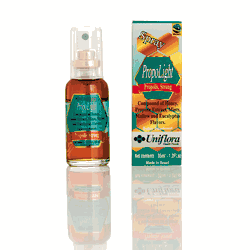BRAZILIAN BEE PROPOLIS SPRAYS
Throat Sprays
A scientific investigation discovered that propolis inhibited the activity of
several streptococcal bacteria species that cause dental caries.Japanese
researchers reported that propolis-fed laboratory fats had far fewer caries than
those given a regular diet. Propolis protected specifically against
Streptococcus mutans and several other strep species (Ikeno K, Caries research,
1991;25:347-51). These strep species are closely related to the germ that causes
strep throat.
Propolis works against bacteria in several ways. One study reported that it prevented bacterial cell division and also broke down bacterial walls and cytoplasm, which is how some prescription antibiotics work (Takaisi-KikuniNB, Planta Medica, June 1994;60:222-7).
Perhaps more remarkable is that propolis acts against viruses, which antibiotics do not. A number of medical journal reports have discussed the role of propolis in fighting upper respiratory infections, such as those caused by the common cold and influenza viruses (Focht J, Arzneimittel-Forschung, Aug. 1993;43:921-3). Other investigators have reported that the cinnamic acid extracts of propolis prevent viruses from reproducing, but they worked best when used during the entire infection (Serkedjieva J, Journal of Natural Products, March 1992;55:294-302)
Propolis works against bacteria in several ways. One study reported that it prevented bacterial cell division and also broke down bacterial walls and cytoplasm, which is how some prescription antibiotics work (Takaisi-KikuniNB, Planta Medica, June 1994;60:222-7).
Perhaps more remarkable is that propolis acts against viruses, which antibiotics do not. A number of medical journal reports have discussed the role of propolis in fighting upper respiratory infections, such as those caused by the common cold and influenza viruses (Focht J, Arzneimittel-Forschung, Aug. 1993;43:921-3). Other investigators have reported that the cinnamic acid extracts of propolis prevent viruses from reproducing, but they worked best when used during the entire infection (Serkedjieva J, Journal of Natural Products, March 1992;55:294-302)
Underpinning many of the benefits of propolis is that some of its
components,like the flavonoids and ethanols, function as antioxidant
free-radical scavengers. A study published in the Journal of Ethnopharmacology
(Jan. 1994;21:9-13)noted that some of the antioxidant phenols in propolis
functioned similarly to vitamin E. In another article, researchers described
that propolis had anti-inflammatory properties and that it could also prevent
blood clots(Drugs Under Experimental & Clinical Research, 1993; 19:197-203)
Read Less
Read Morecopyright © 1996 The Nutrition Reporter - updated 12/04/96
Read Less




